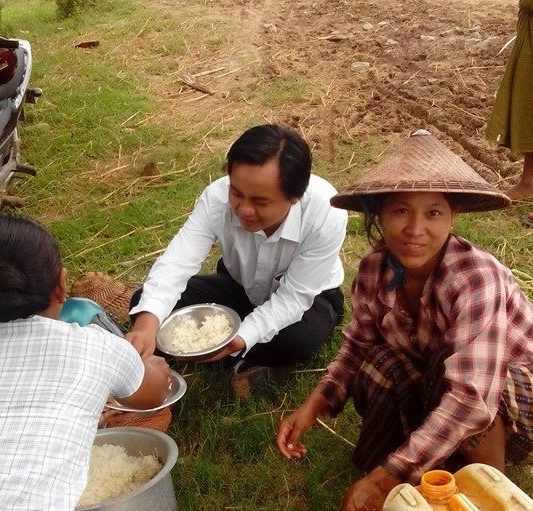This is a photo I sometimes still look at.
I’m sitting on a motorbike, dressed like I’m heading into a meeting—button-up shirt, clean trousers, office shoes. But I’m not in any office. I’m stuck. The wheels of the bike are buried deep in wet mud, somewhere along a half-formed road in Kantbalu Township, Shwebo. The sky is heavy with clouds. The rain had stopped for a moment that morning, just enough to get us going. We rode for an hour through slippery trails to reach a village called Kalalu.
But coming back, the rain returned. And the road disappeared. We had to push and drag that bike for more than three hours just to reach the main road again.
It was my first field trip with a new organization. One that didn’t talk about profit margins or market share. One that spoke instead about farmers, soil, and livelihoods.
I didn’t know how to dress for this world yet.
The World I Came From
Before that, I had spent over a decade in industries where numbers were everything; liquor, FMCG, construction, trading, government tenders. I started as a sales rep and rose to executive director. I worked hard, performed well, and was paid accordingly. Travel was smooth. Hotels were nice. There were no muddy roads, no broken motorbikes. I dined in the best restaurants. And in the liquor industry, one of the toughest and most cutthroat in the country "I thrived".
In that world, mistakes cost millions. Everyone played hard. I launched liquor products that are still on supermarket shelves today. We even exported to Japan. Every time I used my skill set, sales picked up. And I knew the rhythm of the market: where to push, when to hold, how to edge out competition.
Liquor is a giant industry in Myanmar. At least 4 million gallons are consumed every month. Even in the most remote corners of the country, you’ll find a liquor shop with a vinyl banner, even if there’s not a single restaurant nearby. That’s how deep its roots go.
And with four different New Years—Chinese, English, Karen, and Thingyan—plus dozens of festivals and ceremonies, the opportunities to create promotional programs were endless. If you had creativity, you had income. Simple as that.
I was good at it. And I knew it.
The Cracks Begin to Show

But over time, something started to shift. A quiet kind of discomfort.
One day I was reading the newspaper, and a crime story caught my eye. A father had sent his 8-year-old son to buy liquor. The boy slipped on the way back, and the bottle shattered. The father, in a rage, beat him to death.
That story stuck with me. I had just become a father myself.
And I started to wonder—was it my liquor?
That question kept echoing. Day after day. I couldn’t shake it off. Eventually, I made a decision: I would only use my skills for something that made lives better, not worse.
"I left".
Choosing a Different Path
And I began looking for work in a different space—NGOs, social enterprises. I wasn’t sure where I belonged yet. But I knew I had to find a better reason to keep doing what I was doing.
That muddy road to Kalalu was part of that search.
A Grandmother’s Struggle
I remember we arrived in the village soaked and exhausted. We visited the first house we saw. An elderly woman welcomed us in. Six children were running around the yard. She told us they were her grandchildren. Their parents had gone abroad six months earlier and hadn’t been in touch since.
She had a tiny betel leaf farm—just 0.20 acres—and half of it had already died. The other half wasn’t looking good either. She told us, “When this part dies too, I won’t have anything left to feed them.”
The field manager I was with listened quietly. Then he said something simple:
“We’ll help. The rest won’t die.”
Right there, he instructed the sales reps—what steps to take, what inputs to provide, how to adjust the soil, how to set up the support system. Four months later, I visited again.
The sick plants were healthy. The field was green. The children were still there—but now, their grandmother had something to hold on to.
That moment changed something in me.
It gave me the anchor I was looking for.
I stayed with that organization for another five and a half years. And when I eventually left to start my own company, I carried that moment with me.
Learning the Last-Mile Way
Those first years taught me more than any boardroom could. I learned how to:
- Coach sales reps in the field, not just in meetings.
- Understand the cultural nuances of rural communities.
- Walk beside farmers literally, in mud and rain, to see what they see.
- Shift my focus from margins to impact without losing business sense.
Every trip, every muddy road, every hour spent pushing a motorbike through thick soil reminded me that leadership isn’t about titles. It’s about showing up, being present, and making real change
From Lessons to Practice
When I started my own company, I carried these lessons forward. I designed field-based sales training, mentoring programs, and coaching systems for last-mile sales teams across Myanmar. I realized that real growth comes from understanding the lives of the people we serve—and the people we lead.
It’s easy to sit in an office and talk strategy. It’s far harder to sit on a motorbike, sweat through a tropical heat, and negotiate with a farmer who doesn’t care about your credentials but notices your effort.
And it works. Salespeople trained in this way don’t just hit targets—they understand the “why” behind every transaction. They build trust that lasts.
Closing Reflection
Not every turning point is loud. Sometimes, it’s just a muddy road, a dying farm, and a quiet promise kept.
But those moments can rewire your career. They can change how you see leadership, sales, and impact.
For me, that first muddy ride to Kalalu Township didn’t just teach me about farming or logistics. It taught me about purpose. And it set the foundation for the work I do today—helping social enterprises, last-mile teams, and impact-driven organizations thrive in challenging markets.
#LeadershipJourney #CareerTransitions #SocialImpact #SalesLeadership #FieldNotes #Storytelling #LastMile #PurposeDrivenWork #Myanmar #Entrepreneurship #ImpactSales #RuralDevelopment







